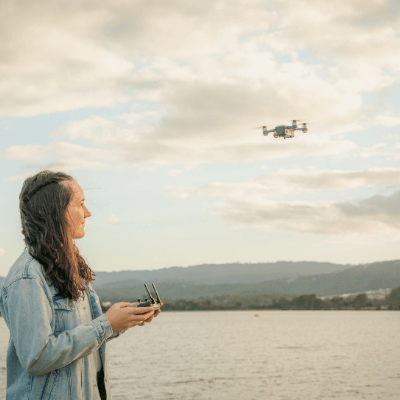What are the rules for commercial drone use in Australia?
- Anyone who uses a drone for business or commercial purposes is required to register their equipment with the Civil Aviation Safety Authority (CASA)
- Registration requirements apply to drones of all sizes and weights
- From an insurance perspective, it’s important to follow the rules around drone registration
Anyone who uses remotely piloted aircraft (RPA) or drones for business or commercial purposes is required to register their equipment with the Civil Aviation Safety Authority (CASA) or face fines of up to $11,100.
Michael McNamara, Head of Aviation for QBE Australia Pacific shares that "according to the CASA'S commercial drone safety rules, it is is an offence to fly an unregistered remotely piloted aircraft (RPA) or drone, regardless of its size or weight, for any business or commercial use."
What is considered a commercial drone activity?
CASA outlines some example activities that may be considered a business or commercial purpose, including:
- Creating photos or video content to be sold
- Inspecting commercial equipment, infrastructure or sites
- Monitoring, providing surveillance or security services
- Creating content for websites where an income is generated from advertising
- Any drone activities on behalf of your employer.
Businesses should consider if RPAs or drones are part of their commercial offering, and if they are, they should confirm if they have taken the necessary actions.
“Estate agents who use drones to take photographs of homes and properties, construction businesses who use surveying drones or even drones used on farms for stock management are in scope,” says McNamara. “There’s a huge range of businesses that use RPA and drones as part of their everyday activities.
"With registration applying irrespective of the size or weight, people who use micro drones to capture images and video to sell are also in scope for registration and licence requirements."
Do I need a drone licence?
 Those who fly or supervise the operation of drones or RPA in an ‘excluded category’ or ‘micro RPA’ category1 for commercial uses, will need to hold either a valid operator accreditation certificate or a remote pilot licence (RePL) from CASA.
Those who fly or supervise the operation of drones or RPA in an ‘excluded category’ or ‘micro RPA’ category1 for commercial uses, will need to hold either a valid operator accreditation certificate or a remote pilot licence (RePL) from CASA.
Individuals must be 16 years or older to register a drone or become accredited operator. An accredited adult (over 18) must supervise any person under 16. It is important to note that owners and operators of commercial drones and RPA can be asked to produce their certificate of registration or operator accreditation certificate to CASA officers, members of the Australian Federal Police, or State and Territory police. Fines of up to $11,100 may be applied to those caught operating contrary to the registration and accreditation rules.
What do these rules mean for your aviation insurance?
From an insurance perspective it’s important to follow the rules set by CASA.
“Failure to register a commercial drone or RPA or to operate commercially without an operator accreditation certificate (or RePL) may give rise to grounds for refusing an insurance claim in the event of an accident or loss involving the drone or RPA,” says McNamara.
“We would always strongly encourage anyone using their drone for commercial purposes to check in regularly with the latest CASA guidance and information via their website.”
Find out more about QBE’s dedicated insurance cover for drones and RPAs
1 For specific weight category requirements for excluded category or micro RPA please visit: https://www.casa.gov.au/drones/accreditation
The views, information, or opinions expressed in this article are general in nature and have not been prepared taking account of your customer(s) or your own personal circumstances, objectives or needs. QBE does not guarantee the accuracy or reliability of any information set out this article. You must decide whether or not it is relevant, and appropriate, in light of your own circumstances. In the event you act on, or rely upon, any of the information or opinions expressed in this article, you do so at your own risk and acknowledge that QBE shall in no way be responsible or liable.




